Just over a month ago, Chris Husbands’ backyard in North Portland was on fire.
The 32-year-old builder of custom vans was in Florida on Sept. 17 when a blaze broke out in a homeless camp behind his house in the Portsmouth neighborhood. It tore through dry blackberry bushes, climbed his wooden gate, and lit his bamboo plants up like a torch.
As the inferno spread, it engulfed a 75-foot pine tree nearby, sending panic through his quiet cul-de-sac. Firefighters rushed to the scene near North Juneau and Attu streets and put out the flames—just yards from Husbands’ modest maroon bungalow.
He learned about it in a text from a neighbor. As he vacationed with his wife, Haley, and year-old son, a ball of stress rose in his chest.
“I don’t give a shit about material things—that’s what insurance is for,” Husbands says. “But I have a kid now and a wife, and I worry about their safety.”
What scares him: It could happen again. In the past two years, at least three fires have started in the tent colony on the edge of his neighborhood. The tree-cloaked camp, where roughly a dozen people live, lies next to the Union Pacific Railroad, accessed by footpath, and is difficult for fire engines to reach.
“The general stress of the situation sucks,” Husbands says. “I don’t know what to do.”
He’s not alone. Nearly half of all fires in Portland now start in or near houseless camps—at least 2,048 last year, according to Portland Fire & Rescue data. It’s a remarkable number, given how five years ago, fires among unhoused Portlanders were hardly a blip.
Today, there are an average of six a day.
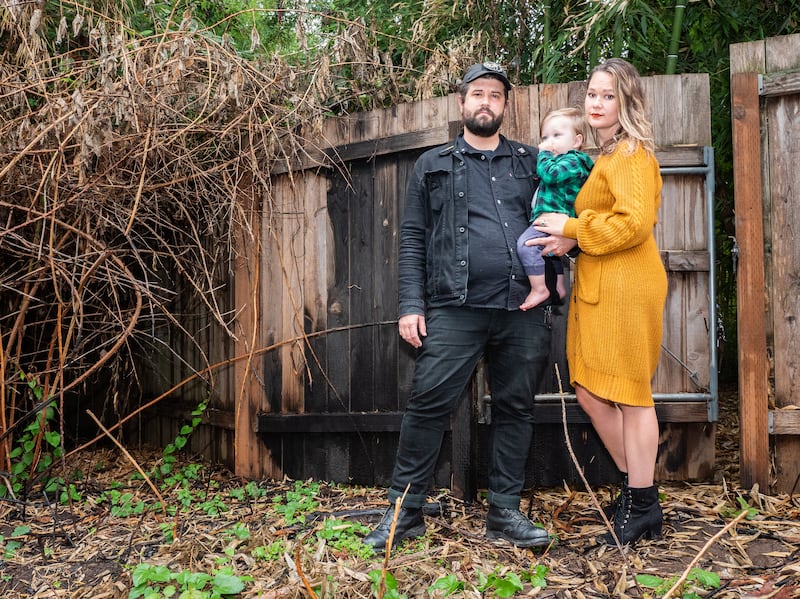
The fires spread from homeless camps in wooded areas, alleys and abandoned lots to adjacent homes and businesses. They frighten families, displace residents and exhaust firefighters.
The blazes have killed at least nine unhoused people in the past four years, one-third of Portland’s fire fatalities. Homeless people have been injured and lost possessions and loved ones.
“We don’t mind going on dangerous calls—we’re here to do that,” says Capt. Mike McGowan of North Portland’s Station 8 firehouse, which stands among the city’s worst-hit areas. “But five or six houseless fires in the middle of the night is too much. It’s fatiguing to go on the same type of call over and over, with no end in sight. It’s not sustainable.”
It’s one of the most dangerous, underreported and resource-draining side effects of Portland’s staggering homelessness problem, advocates and officials say. And it is a measure of civic crisis. Seattle, a larger city than Portland, saw 1,446 unhoused fires last year, two-thirds the number in Portland.
As this city fiercely debates strategy for where people without homes should go, it’s worth considering the consequences of the camping policy City Hall has pursued since 2016—especially as climate change increases the risk of outdoor fire.
“It’s a tragic situation,” says City Commissioner Jo Ann Hardesty, who oversees Portland Fire & Rescue. “These and every fire pose a significant public safety risk for Portlanders—housed and unhoused.”
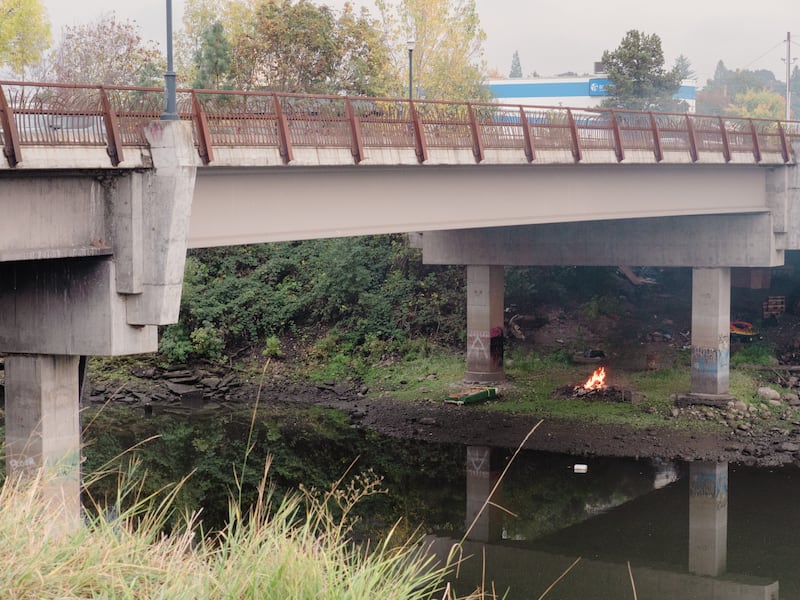
Mitchell was jolted awake by a searing pain in his feet. The 60-year-old homeless man sat up and saw the side of his makeshift plywood shanty on fire.
He scrambled out of the structure, under the North Vancouver Avenue overpass next to the waters of the Columbia Slough. It was before dawn on the below-freezing morning of Nov. 29, 2019, and he was barefoot.
“People were yelling, ‘Mitchell, help!’” he says. “I looked up and there was a wall of flames.”
Fueled by sleeping bags, trash and plastic tarps, the fire had spread to a row of four more homemade huts. Inside a fifth, a woman lay inert.
“I ripped open her door and dragged her out,” says Mitchell, a rail-thin former Army officer who goes by his last name. “I was in super shock.”
None of his unhoused neighbors had a cellphone to call for help as the flames raged between Columbia and Schmeer roads. Mitchell ran into traffic and eventually flagged down a car. “I said, ‘Call 911!’”
By that time, everything he owned—his prized work boots, warm clothes and tools—was gone. When the smoke cleared, he had third-degree burns on the bottom of his feet and no place to go.
Mitchell carries a 6-inch knife on his belt and suffers from stomach cancer and a crushing opioid addiction. He has been houseless for two decades and says that “fire is the No. 1 worst thing that can happen at a homeless camp.”
“It puts pressure on people who have no backup,” he says.
As unhoused people shiver through Portland’s damp winter months, they often use portable propane heating sources to avoid “freezing their asses off,” but not everyone is careful, Mitchell says.
Gas stoves and heaters—including jury-rigged devices—ignite highly flammable camping gear such as tents, tarps and sleeping bags, says McGowan, the fire captain.
Houseless people have been known to set one another’s possessions on fire, according to firefighters and Mitchell. They also sometimes burn garbage without properly putting out the fire afterward.
In other cases, unhoused people use flames to smoke or shoot opioids then pass out and don’t notice a fire spreading. “A lot of times they left a heating source on and they have nodded off on heroin,” says firefighter Garrett Poetsch, who works with McGowan at Station 8.
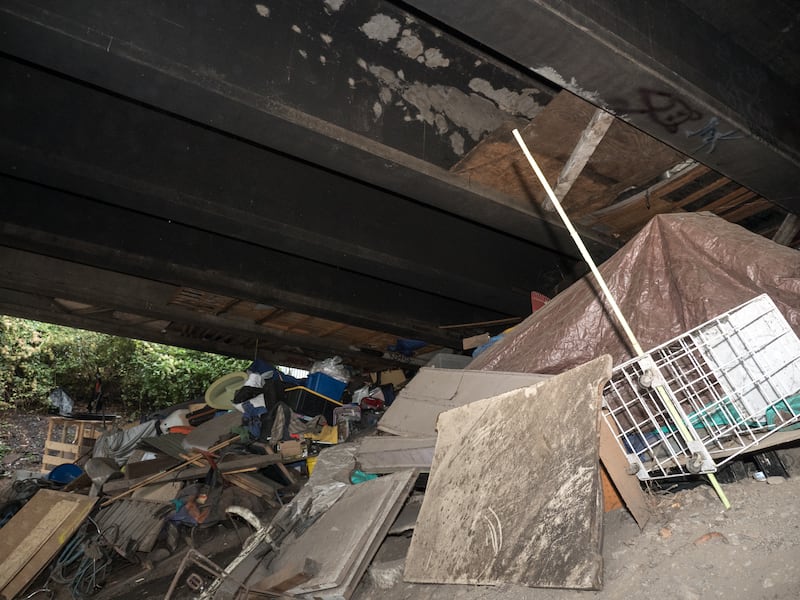
Drugs were partly to blame for the fire that destroyed Mitchell’s plywood home in 2019, he says. A friend had nodded off with a candle and didn’t wake up for several minutes as the fire grew.
“It burned off half of his hair, all the way to his skin,” Mitchell says. Firefighters put out the blaze with a hose. Nobody was killed.
But on Feb. 9, 2021, an unhoused Portlander named Skyler was killed when his shanty burst into flames under the same North Vancouver Avenue bridge. (The Multnomah County medical examiner declined to release his full name.)
The 27-year-old skateboarder had rigged a heating device out of a leaf blower to stay warm, Mitchell says. It caught a plywood slab on fire and the flames quickly spread.
Skyler became trapped inside the shelter and eventually tumbled down to the Columbia Slough with third-degree burns, fire officials say. He was rushed to a hospital where he died a couple of hours later.
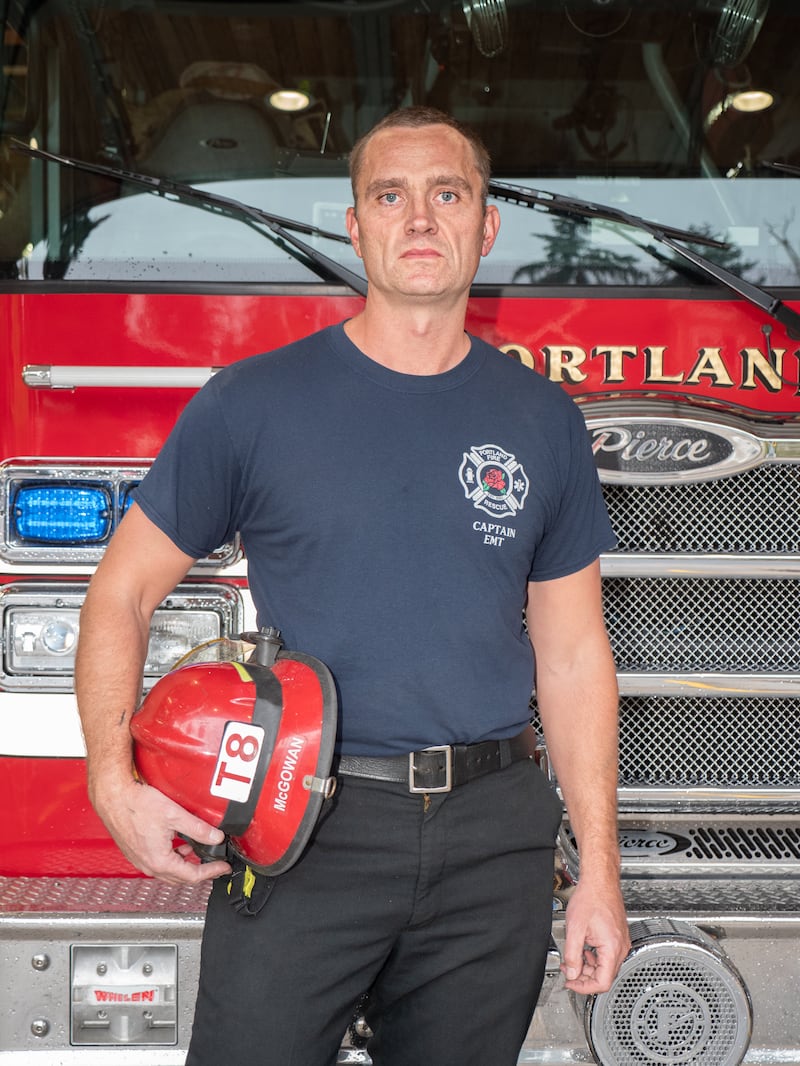
On a recent warm Tuesday, Rich Espino pointed to a charred second-floor office window at North Hunt Street and Argyle Way: “When we got here, the fire was ripping all the way up.”
The 37-year-old firefighter and his crew at the Station 8 firehouse in Arbor Lodge had rushed to the blaze at 8:08 am on Sept. 23.
A propane tank exploded inside a small camper owned by Cuba, a houseless man who walks with the aid of a crutch, according to houseless neighbors and firefighters. The fire spread from an alley, then burst through the window of M&M Construction at 643 N Argyle St.
“It went right up the side of the building,” Espino says. “There were two employees inside and they went scrambling out.”
Espino looks plucked from the cast of Chicago Fire, with salt-and-pepper hair, a brawny build, and 5 o’clock shadow. But he and his co-workers make the fictional characters look like slackers.
The station’s territory—which includes Delta Park and sections of the Columbia Slough—is among the city’s most afflicted by homeless fires. Firefighters there sometimes rush to five or six of them a day, they say.
The fires have broken out in nearly every area of the city, with problem pockets close in on the east and west sides of the Willamette River, according to department data from April 2021 to April 2022. A map also shows concentrated clusters in North Portland near the Columbia River and east toward Gresham.
Responding to a camp fire isn’t as cut and dried as a house fire.
Firefighters often have little idea what to expect before they arrive. That’s because the city’s overburdened 911 dispatch center tends to create a lag between a fire’s inception and the station receiving a report of it, McGowan says.
“We don’t know how bad it’s going to be; it could have been burning for six minutes or 15 minutes,” McGowan says.
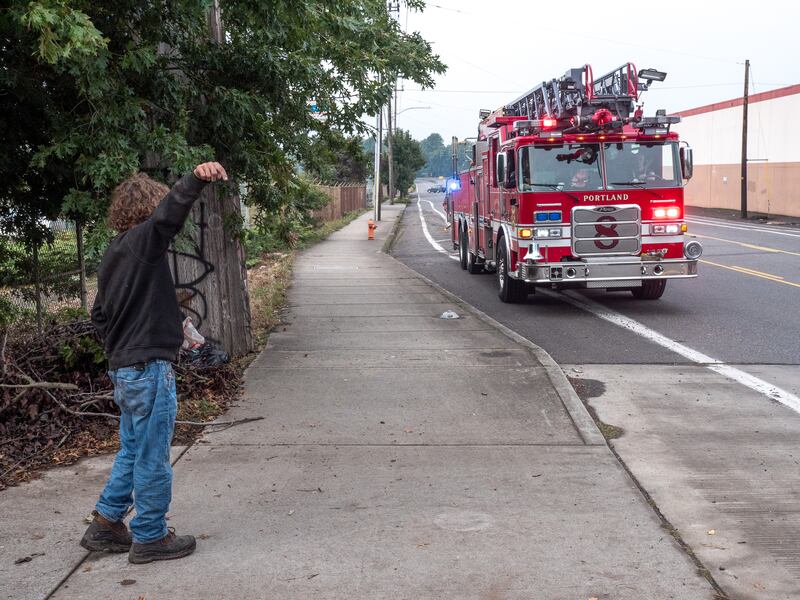
Once at the camp, firefighters size up the scene, both to see if they need more engines and to look out for potential hazards—such as hypodermic needles, buckets of feces and aggressive dogs, the firefighters say.
“We’re not just going to go barging in,” Poetsch says. “Some of them we don’t feel safe going into.”
And as men in uniform, they’re not always welcome at tent colonies. Firefighters say they’ve stumbled onto booby traps, territorial people suffering from mental illness, and a semi-automatic rifle partly melted by a blaze.
“I never thought we’d need ballistics vests, but we do now,” McGowan says.
In July, a fire bureau memo stressed that “safety is the number one challenge fire crews face on houseless fire calls.”
“Crews are increasingly confronted with aggressive and violent behaviors and are routinely forced to balance the risks of physical confrontation against the risks posed by illegal burning,” it stated.
Access is another problem. Camps are often set up in hard-to-reach forested or fenced-off areas inaccessible by fire engine. When that’s the case, firefighters must approach on foot with hand-held extinguishers, McGowan says.
With his glasses, love of statistics and subtle bags under his eyes, McGowan has the air of a friendly but burned-out history teacher.
On a recent ride-along with WW, McGowan and his crew passed a 2-mile stretch of RVs near Northeast 33rd Avenue and Marine Drive, where fires have turned trailers into smoldering metal shells.
“A lot of times we don’t know how they started because they’re so badly burned when we get there,” McGowan says. “They go up fast.”
They cruised by a scorched patch of grass in Delta Park and spotted smoke rising from a small fire. McGowan chose not to stop; it posed no immediate safety hazard.
By his count, his station went on roughly 10 times as many houseless fire calls in 2021 as it did a decade before that, despite budget and personnel cuts.
(In the previous fiscal year, Portland firefighters logged more than 16,000 hours of mandatory overtime—extra hours they were forced to work—as the fire bureau was plagued by staffing shortages.)
The flood of calls can delay firefighters’ response time to bigger blazes, as well as medical emergencies. “If your mom’s having a heart attack,” McGowan says, “our response to something like that could be delayed because of this.”
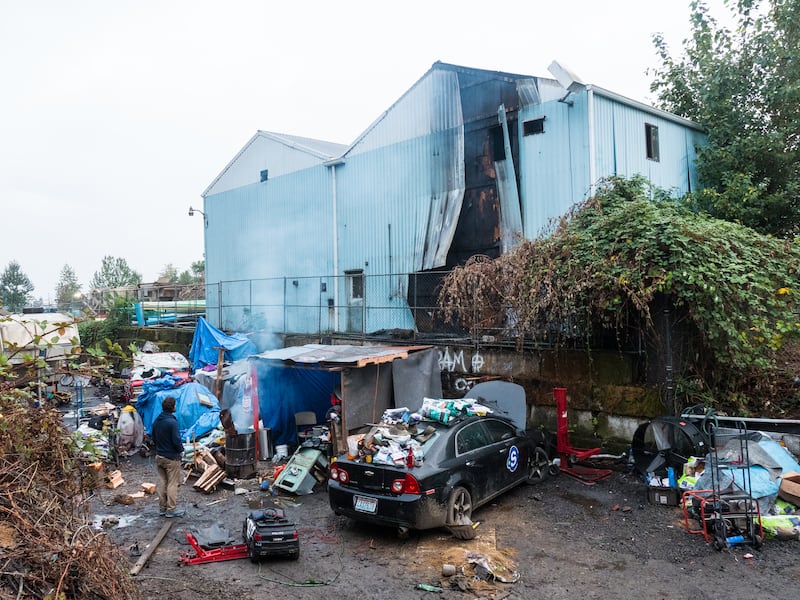
As the number of camp fires increases, so do the odds that they’ll spread to other places.
In June, the workers at Cutting Edge Custom Cabinets in the Piedmont neighborhood rushed to extinguish a burning tire. It had been set alight by a mentally ill woman living at a nearby camp, employees say.
It wasn’t the first time the shop, which stands next to the train tracks near North Mississippi Avenue and Kilpatrick Street, had battled blazes.
In recent months, the woman has allegedly swiped several tires from the used auto parts shop that shares a lot with Cutting Edge. She lights them on fire and inhales the fumes to get high—then sometimes leaves them smoldering, according to fire officials and workers.
In the past two years, the shop has been hit by three serious fires set by residents of a nearby camp, workers say.
“It’s scary. Especially in a wood shop, everything would go up so fast,” says sales assistant Justin Saephan, 30, gesturing toward shelves of panels. “There’s nothing you can do other than get angry.”
The fire bureau could not provide figures for how many fires have spread from homeless camps to commercial and residential buildings. But dozens of property owners have been plagued by property damage and disturbances, WW has learned.
On Sept. 26 of last year, a camp fire engulfed the side of an apartment owned by the affordable housing nonprofit REACH Community Development—causing thousands of dollars in damage and displacing one resident. “This has heightened our concern about unmanaged camping in close proximity to buildings,” says Lauren Schmidt, a spokeswoman for the group.
On the night of Sept.10, a propane tank exploded in a makeshift camp kitchen on a sidewalk in Southeast Portland. The fire erupted at 8th Avenue and Main Street, next to the White Owl Social Club and several retail stores.
Lynette Jones had planned to open her vintage shop, Rose & Wood, across the street the following Saturday morning. But she changed her mind when she spotted the charred mess covering half a city block.
She saw a homeless man dragging his partially burned possessions across the street in front of her store. His charred makeshift stove and boxes of flour, macaroni and Jell-O were strewn across the sidewalk.
“I worry first for the people having to live like that—and second, it does affect the surrounding people and buildings,” she says. “It’s a public safety problem.”

How to address this problem reflects the city’s larger paralysis and bitter disagreements about homeless camping.
On the night Husbands’ backyard caught fire, Israel Banks, 24, used a garden hose to keep the flames at bay until firefighters arrived.
Banks says he grew up poor and sympathizes with the unhoused people who live behind his house. But he suspects Portland’s tolerance for public camping played a role in the fire danger that sparked panic in his neighborhood.
“It went from us being so supportive of homeless people to now we’ve enabled them to live dangerously like this,” he says. “Something needs to change.”
Commissioner Hardesty, whose fire bureau is now overwhelmed, contends the root of the fires is “extreme poverty” and “lack of shelter and affordable housing” in Portland.
“The latest statistics are alarming and underscore the urgency of sheltering and housing our most vulnerable Portlanders while looking at additional ways we can prevent dangerous fires through outreach and education in the short term,” she tells WW. “The long-term solution is providing an adequate safety net, including a warm, dry place for everyone to sleep.”
She also wants more funding for the fire bureau and personnel to address the problem.
“Fire & Rescue needs a greater investment to provide more of these needed resources. This fall, she plans to ask “Mayor Wheeler to authorize hiring 13 firefighters and to restore funding for the rapid response vehicle program, which can be used to extinguish small fires,” she said.
Portland Fire Chief Sara Boone declined to comment on a possible solution.
Capt. McGowan, meanwhile, supports a plan to create designated camping areas for houseless people in Portland, like the one outlined by Mayor Ted Wheeler last week. The resolution would build at least three large, city-sanctioned camping sites and ban unsanctioned houseless encampments outside those areas.
Workers at those sites could monitor kitchens and heating sources to minimize fire risk, McGowan says. “Letting them live outside in these conditions is the exact opposite of compassion. It’s dangerous.”
Glenn Murphy, 54, who lives alone in a single-tent camp in St. Johns, thinks a modification of Wheeler’s plan could fix the problem. He says larger encampments and ones too close to buildings should be moved to designated houseless sites.
“I think it would be a lot safer,” Murphy says. “That way they could be watched and there would be less crime and fires.”
Husbands, whose yard was scorched, wants the city to launch an outreach program to distribute hairspray-sized extinguishers and other cheap fire suppressants to houseless camps. It may require a grant for beefed-up education and supplies, he sats.
After he returned from Florida with his family, he chopped down 60 burnt bamboo branches. He also cleared out the leftover blackberry bushes.
Husbands plans to install a sprinkler system. He hopes to talk with nearby campers and to bring them “a six-pack and a pile of fire extinguishers.”
For a stint in his 20s, he, too, was houseless, living on a school bus.
He considers the unhoused people who live behind his home neighbors.
“I’m actually a go-with-the-flow person,” Husbands says, “but there’s a level of carelessness that’s causing these fires.”
Haley Husbands is fed up, too. “We don’t mind them being back there,” she says. “We just don’t want them to burn our house down.”
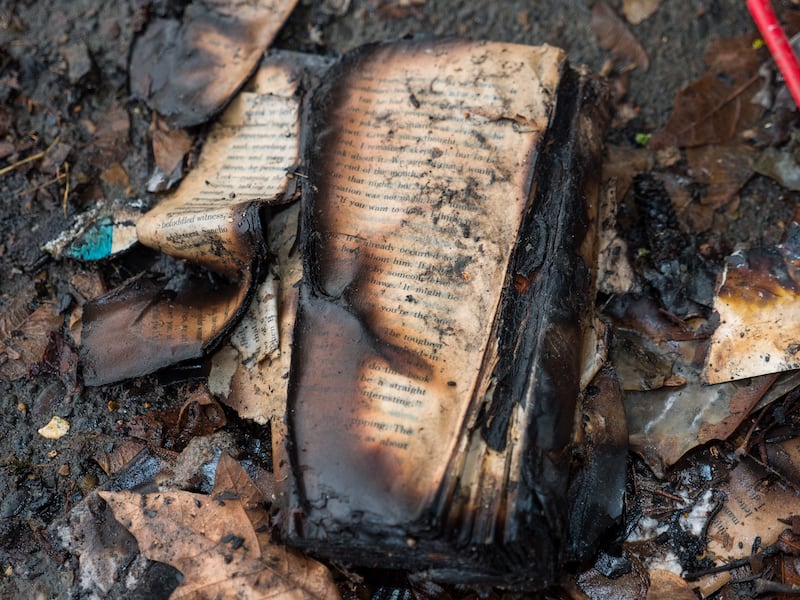
Burn After Reading
Most blazes that flare up among the unhoused start with illegal fires. But the rules are rarely enforced.
Under the city’s outdoor burning rules, “recreational” fires with “clean, dry cord-type firewood” are allowed in public spaces without permits when no burn ban is in effect.
Such campfires must be in a “pit or pan” and at least 25 feet away from any building or structure, including a tent. They must also be “less than 3 feet in diameter” and “less than 2 feet in height,” according to the guidelines.
Most houseless fires don’t meet those legal criteria, says Lt. Laurent Picard of the Portland Fire Marshal’s Office. But his office must be judicious about enforcement because the problem is so widespread, with hundreds of camps citywide, he says. “It’s all hazard and life safety based.”
Remarkably, the Fire Marshal’s Office doesn’t have many teeth to enforce outdoor fire rules. It has only the power to “recommend” that the city’s Homelessness and Urban Camping Impact Reduction Program and Street Services Coordination Center clear camps with illegal fires that present safety hazards.
Picard says he generally recommends a camp be removed if it has a larger fire that endangers life or property—or has “repeated lower-hazard fires.”
Other examples include camps that have scorched the side of a structure, have bonfires so big their smoke obscures roadways, or are hostile to firefighters.
In rare cases of “imminent” danger to life or property—such as a camp igniting a building or people there continuing to light fires—the fire marshal can call on police to immediately remove campers.
In periods of extreme cold, the Fire Marshal’s Office is “generally more lenient” about enforcement of illegal campfires, Picard says.
“Portland Fire & Rescue is constantly balancing the enforcement of illegal fires in houseless camps with the very real danger that houseless people could die on our streets from hypothermia during periods of extremely cold weather,” he tells WW.
During the city’s burn ban periods, generally from late July to early October, the fire bureau leans on outreach groups to prevent “catastrophic wildfire incidents” in “wildland-urban interface areas,” such as Forest Park, according to a July fire memo sent by City Commissioner Jo Ann Hardesty.
“As a last and final resort, the Homelessness Urban Camping Reduction Program will relocate camper(s) who decline to voluntarily relocate from the designated high-risk wildfire hazard zones within the city,” it states.
Between September 2021 and March 2022, Portland Fire & Rescue crews referred 157 illegal campfires to the bureau’s Prevention Division, which is responsible for reducing the number of fires, fatalities and injuries among high-risk populations.
“There is significant fire risk for houseless folks,” says Jonna Papaefthimiou, interim director of the Portland Bureau of Emergency Management. “I have heard about some terrible fires, and I know my colleagues in the parks [bureau] worry about it too.”
